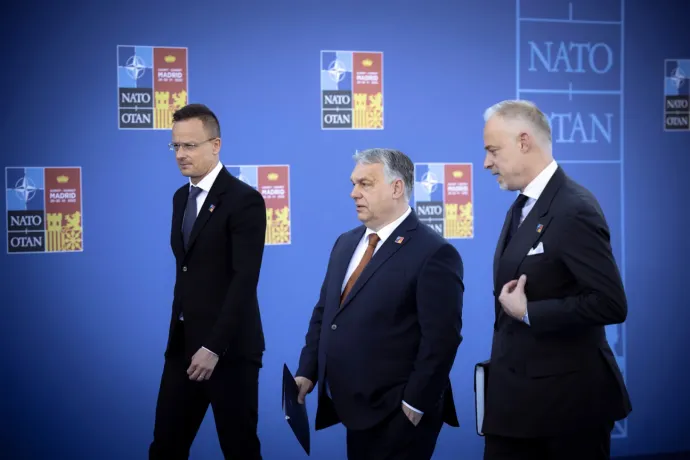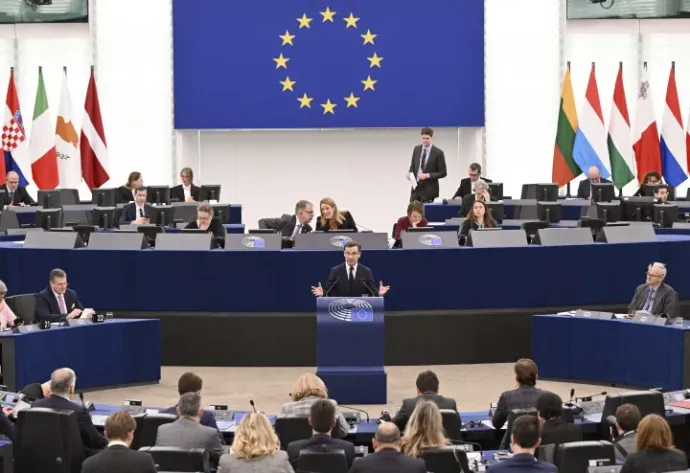Although Sweden has taken a hard line on Orbán, there may be a more complicated deal behind the NATO accession vote

Fierce debates on migration, the exclusion of Fidesz from the People's Party and an EU presidency organized around the rule of law are just a few examples of the reasons why members of Hungary's governing parties may be picking on Sweden by blocking the country's accession to NATO. While MPs of the ruling coalition talk of being offended, opposition members say that with this behavior, Hungary is actually serving Turkey's interests. The real reasons, however, are anyone's guess. If we look beyond the insults listed by Fidesz-KDNP, it is plainly visible that several Swedish politicians have managed to cross the Hungarian governing parties in recent years.
"Unfortunately, there have been a lot of negative and insulting comments from the Swedish side in recent years, I have a whole bundle of these statements", State Secretary for Foreign Affairs Péter Sztáray said during the debate on the committee's report on Sweden's NATO accession proposal. Several government representatives, including Balázs Orbán, the prime minister's political director, had earlier listed the statements made by Swedish politicians at length, which could be the reason why several government politicians still do not support the Nordic country's accession to NATO.
Since you're here, we invite you to be a part of shaping Telex English! Take a few minutes to fill out our anonymous survey, and tell us what you think about Telex English and how it could be even better!
These insults have already been read out in parliament once by KDNP politicians during the joint debate on the ratification proposal. The government and Fidesz-KDNP are actually playing a double game on this: Viktor Orbán and the government itself are supposedly fully in favor of Swedish accession, and it's the members of the ruling parties who are taking offense. It seems that the Finns have managed to reassure the worried MPs that there will be no more such "insults", but the Swedes have not.
Meanwhile, of course, many, including opposition politicians, are speculating that this apparent offended behavior is just a red herring, and in reality, the Orbán government wants to decide on this issue in line with the Turks.
It was two days after Turkey's announcement, on 17 March, that Hungary announced that it would only approve the accession of Finland for the time being. Orbán visited Ankara on 16 March, where he held talks with the Turkish president at a meeting of the Organisation of Turkic States. However, no Hungarian government politician suggested that a Turkish request was behind the delay in allowing Sweden to join NATO. After the prime minister, President Katalin Novák also traveled to Ankara last week where, in a meeting with the Turkish president, it was discussed that
Turkey would contribute to supplying Hungary with gas.
Due to the alleged "uncertainty" within Fidesz and KDNP, the Hungarian parliament has still not been able to decide on Sweden's NATO membership. Despite requests for specific reasons, for example from opposition MPs, the governing parties have not given any more specific rationale, except for quoting the "insults". Nor did they say what concrete steps the Swedes should take to bring about a reconciliation. What is clear, however, is that in recent years there has been much more discord than friendship between Swedish and Hungarian politicians and the two governments.
Yet good relations with the Swedes are important for Hungary, precisely because of its military. Under an earlier agreement, extended in 2012, Hungary is leasing the Gripen fighter jets of the Hungarian Air Force from Sweden until 2026. Last year, Gáspár Maróth, the government Commissioner for Defense Development, said that the agreement, which expires in three years, could be extended for another ten years, but that this would have to be renegotiated soon. The question is what impact the current process will have on the deal: whether the Hungarian government has already asked for concessions in return for support, and how much the Hungarian fuss over their NATO membership will affect the attitude of the Swedes.
There has been much conflict over migration management
If we set aside the sentences quoted by the governing party MPs and take a closer look at the conflicts between the Hungarian and Swedish governments, it is clear that the relationship has not been smooth. The most intense and fiercest dispute between the two sides was over the management of the migration crisis, back in 2015-2016. During the 2015 refugee crisis, the Hungarian government, unlike the Swedish government, took an explicitly anti-migration stance.

At a meeting of Scandinavian foreign ministers in 2016, Swedish Immigration Minister Morgan Johansson said that immigrants who had not been granted a residence permit in Sweden and were first registered in the EU in Hungary would be sent back to Hungary. However, the Orbán government, had repeatedly stated that it will not accept returned refugees. For this reason, Sweden had even tried to take Hungary to the EU Court of Justice, invoking the Dublin Convention. The Swedish minister also wanted to create a Northern Front against Hungary to put joint pressure on Budapest for readmitting refugees. The Swedish interior minister, meanwhile, argued that
the Swedes had "paid" Hungary through the European Union to protect the EU's borders.
According to the minister, Hungary has failed to comply with EU rules on the admission of refugees, which could lead to "those who do not respect the obligations they have undertaken not getting paid".
"Hungary contributes to duty-free trade, we have allowed Swedish capital in, so it is impertinent to claim that they are giving us money," the prime minister said at the time, defending himself against the Swedish accusations. At the time, Orbán was able to perfectly incorporate the Swedes' accusation into the campaign on the "quota referendum", which was then under way in Hungary, and in which they had asked Hungarians whether the European Union should be able impose the compulsory resettlement of non-Hungarian citizens in Hungary without the consent of Parliament.
It was precisely this (otherwise invalid) referendum that the so-called "no-go zone" propaganda was part of. Both the government and Fidesz-KDNP MPs frequently spoke of the fact that, as a result of mass immigration, the European powers had "lost control of the metropolitan areas populated by immigrants, which have become a hotbed of terrorism".
Their campaign was accompanied by a leaflet and promotional materials identifying these no-go zones, which included areas in the UK, France, Denmark, Belgium, Germany and Sweden.
The case triggered a huge international response. The Swedes requested the Hungarian foreign ministry to remove them from the list and repeatedly stated that no-go zones do not exist in their country. In response to their request for removal, the government printed out the map and distributed it to almost all Hungarian households as part of the referendum campaign.
After the quota referendum concluded, the public media and media outlets close to the government started to once again proclaim that Sweden is dangerous because of migrants. In support of this, they featured a woman who they claimed had worked in Stockholm and had returned to Hungary because of the "deteriorating public safety" there. The woman was eventually found to have been convicted of several charges in Sweden, including seven counts of defamation, a crime against public trust and harassment. After the video was published, Híradó.hu claimed that the story of the Swedish-Hungarian woman had prompted more Hungarians in Sweden to come forward and say they did not feel safe because of the immigrants.
Swedish MEPs were the most vocal about excluding Fidesz from the EPP
But there may be another point that the Fidesz MPs may have noted for themselves about the Swedes. In 2019, Hungary was flooded with billboards depicting Jean-Claude Juncker and George Soros, with the slogan "You have the right to know what Brussels is up to!". The posters were not a big hit in the EU. The case prompted Swedish MEP, Gunnar Hökmark to try to call an extraordinary meeting of the European People's Party, of which Fidesz was then still a member.

At the time, the issue of excluding Fidesz from the European People's Party was already on the table, and Swedish MEPs at the People's Party urged this repeatedly, even taking the lead on the issue. The above-mentioned Swedish MEP spoke publicly about Orbán's role in the People's Party being nil and Fidesz being completely isolated.
The matter eventually escalated to the point where two Swedish parties – the Moderates and the Christian Democrats – initiated the exclusion of Fidesz from the European People's Party. This was justified by the Juncker-Soros poster campaign and the rule of law proceedings against Hungary. After an extended time of wrangling, the procedure ended in a suspension, followed by years of ongoing debate about the relationship between the party family and the Hungarian governing party. Finally, in March 2021, it was announced that Fidesz would leave the EP parliamentary group of the People's Party, and then – as the end of the exclusion procedure approached – Fidesz left the EPP voluntarily. "It's time to say goodbye", Katalin Novák, Fidesz's Vice-President responsible for Foreign Affairs at the time, commented on the letter of departure.
Swedes value the rule of law, and they are vocal about it
Sweden had a Social Democratic leadership until last autumn, which may explain many of the conflicts between the Hungarian and Swedish governments. Since October, however, Ulf Kristersson, leader of the conservative Moderate Party, has been prime minister. Kristersson has entered a coalition with the Liberals, but his government is also supported from outside by the anti-immigration, nationalist Swedish Democrats.
In view of this, many expected the new, mainly right-wing, anti-immigration Swedish governing coalition to have a more friendly relationship with the Hungarian government. These expectations are contradicted by the fact that Sweden, which has held the rotating EU presidency from early 2023, has put the rule of law at the heart of its presidency. As is well known, the European Commission has been critical of the situation of rule of law in Hungary, which is one of the reasons why Hungary has still not received EU funds.
The most important thing is that the EU respects the rule of law as the basis for political, legal and economic cooperation.
– Ulf Kristersson said, speaking at a session of the European Parliament in Strasbourg. He added that the European Union is not authoritarian and that it should be a club of democracies. He also said it was important to have a rule of law mechanism to protect the EU budget and stressed that liberal democracy is what distinguishes the EU from other international organizations.

Hungary is currently denied access to EU funds precisely because of the so-called rule of law mechanism. And as far as Orbán's views on liberal democracies, they are well known: back in 2014, the prime minister said that he believed democracy was not necessarily liberal, which is why Hungary is building an "illiberal democracy".
It remains unclear what exactly is the underlying interest or reason why Hungary, or more precisely the governing party majority, still hasn't approved Sweden's accession to NATO. At the moment, it is not even known when the point will be reached when the MEPs will stop feeling 'offended' and vote in favor of the proposal. Especially after a Hungarian negotiating committee has already been to Stockholm to settle the contentious issues.
At the end of the diplomatic programme, the head of the committee, Csaba Hende, said that they would support Sweden's accession. Earlier, Fidesz politicians also promised that Hungary would not be the last to ratify the Swedish application. However, Turkey has repeatedly stated that Sweden should take further steps against supporters of Kurdish militants. The question remains as to which will happen first: whether the offended Hungarian MPs will be "appeased" before the Turkish concerns are addressed, or whether the two processes are closely interlinked.
For more quick, accurate and impartial news from and about Hungary, subscribe to the Telex English newsletter!